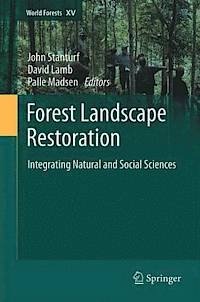
Ebook: Forest Landscape Restoration: Integrating Natural and Social Sciences
- Genre: Biology // Ecology
- Tags: Landscape Ecology, Forestry Management, Environmental Management, Sustainable Development, Social Sciences general
- Series: World Forests 15
- Year: 2012
- Publisher: Springer Netherlands
- Edition: 1
- Language: English
- pdf
Restoration ecology, as a scientific discipline, developed from practitioners’ efforts to restore degraded land, with interest also coming from applied ecologists attracted by the potential for restoration projects to apply and/or test developing theories on ecosystem development. Since then, forest landscape restoration (FLR) has emerged as a practical approach to forest restoration particularly in developing countries, where an approach which is both large-scale and focuses on meeting human needs is required.
Yet despite increased investigation into both the biological and social aspects of FLR, there has so far been little success in systematically integrating these two complementary strands. Bringing experts in landscape studies, natural resource management and forest restoration, together with those experienced in conflict management, environmental economics and urban studies, this book bridges that gap to define the nature and potential of FLR as a truly multidisciplinary approach to a global environmental problem.
The book will provide a valuable reference to graduate students and researchers interested in ecological restoration, forest ecology and management, as well as to professionals in environmental restoration, natural resource management, conservation, and environmental policy.
Restoration ecology, as a scientific discipline, developed from practitioners’ efforts to restore degraded land, with interest also coming from applied ecologists attracted by the potential for restoration projects to apply and/or test developing theories on ecosystem development. Since then, forest landscape restoration (FLR) has emerged as a practical approach to forest restoration particularly in developing countries, where an approach which is both large-scale and focuses on meeting human needs is required. Yet despite increased investigation into both the biological and social aspects of FLR, there has so far been little success in systematically integrating these two complementary strands. Bringing experts in landscape studies, natural resource management and forest restoration, together with those experienced in conflict management, environmental economics and urban studies, this book bridges that gap to define the nature and potential of FLR as a truly multidisciplinary approach to a global environmental problem. The book will provide a valuable reference to graduate students and researchers interested in ecological restoration, forest ecology and management, as well as to professionals in environmental restoration, natural resource management, conservation, and environmental policy.